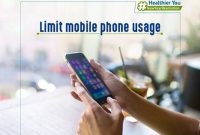In this digital age, it’s becoming increasingly difficult to put our phones down. From scrolling endlessly through social media feeds to mindlessly watching videos on YouTube, we are all guilty of spending too much time on our mobile devices. While smartphones have become an essential part of our daily lives, excessive usage may lead to severe addiction and have a considerable impact on our mental well-being. The good news is that with a few easy tips, reducing phone addiction is possible. Here are some practical steps you can take to minimize your screen time and take back control of your life.

The Harmful Effects of Phone Addiction
With the technology we have today, it has become so easy to connect with anyone from anywhere in the world with just a tap on our smartphones. While it may have many benefits, it also has its downsides, and one of them is phone addiction. Being addicted to your phone can lead to negative effects on your physical and mental health, relationships, and productivity.
Physical Health
Spending hours upon hours on your phone can lead to physical health problems that you may not even realize. For example, frequent usage of phones has been linked to eye strain, headaches, neck pain, and digital thumb. It’s amazing how such a small device can cause so much stress throughout the body.
- Take breaks often: It is essential to take breaks every hour to allow your body to reset itself. Do some stretches, take a walk to refresh your mind and body.
- Reduce blue light exposure: Blue light emitted from the screens can cause significant damage to your eyes. Use apps like f.lux on your phone to reduce blue light or buy blue light-blocking glasses.
Mental Health
Addiction to phones can cause issues with anxiety or depression. This addiction can lead to insomnia, which can take a toll on your emotional state.
- Set Screen Time Limits: Both iOS and Android have introduced built-in features to remind you of your phone usage and set screen time limits. Use these features to keep track of your screen time.
- Limit Social Media: Social media is a black hole that can suck you in time and time again. Limit your time spent on social media or take a break altogether.
Relationships
Excessive phone usage can lead to a lack of emotional and physical intimacy with people around you, including family and friends. It can also cause social isolation.
Make sure you take the time to disconnect from your phone and focus on those around you. Leave your phone in another room while spending time with family and friends and give them your full attention.
Productivity
It’s no surprise that constant phone usage can cause you to lose focus and be less productive.
| Ways to increase productivity: | |
|---|---|
| Avoid checking notifications: Turn off unnecessary notifications to avoid distractions. | |
| Set Priorities: Create a list of things you need to do and prioritize them. |
Assessing Your Phone Use
If you find yourself constantly checking your phone, you’re not alone. Research shows that the average person spends about 3 hours a day on their phone, with some spending up to 8 hours. While phones have become an essential part of our lives, excessive usage can lead to addiction, which can have negative consequences on our mental health and relationships. The first step to reducing phone addiction is to assess your phone use.
Track Your Usage
An effective way to determine if you have a phone addiction is to track your phone usage. This can be done by using apps like Moment, which records how much time you spend on different apps every day. The app will also show you trends in your phone usage, indicating which apps you spend the most time on and how much time you spend on your phone overall. Tracking your phone usage can help you set goals to reduce your screen time.
- Set Realistic Goals
Once you’ve tracked your phone usage, it’s time to set goals to reduce it. Start by setting realistic goals that you can achieve. For example, if you’re spending 5 hours a day on your phone, don’t expect to cut it down to 1 hour a day overnight. Instead, start by reducing your usage by 30 minutes a day and gradually increasing the time until you reach your desired daily usage.
- Take a Break
Another effective way to reduce phone addiction is to take a break from your phone. You can start by designating specific times of the day when you’re not allowed to use your phone, such as during meals or before bedtime. During these periods, put your phone on silent or turn it off to avoid the temptation of checking it.
- Find Alternative Activities
Lastly, finding alternative activities to occupy your time instead of using your phone can also reduce addiction. For example, you can start a new hobby like reading or painting, or spend time with friends and family. Find activities that you enjoy doing that don’t involve your phone, and make them a part of your daily routine. Not only will this reduce your phone addiction, but it can also improve your mental health and overall well-being.
Easy Tips for Reducing Phone Addiction
Phone addiction is a real problem that affects millions of people worldwide. It can lead to decreased productivity, poor communication, and even physical health problems. Fortunately, there are several easy tips you can implement to reduce your phone addiction and regain control over your life.
Setting Boundaries
Setting boundaries is a crucial step in reducing phone addiction. To set boundaries, you first need to identify the areas of your life where you feel most vulnerable to phone addiction. This might include work, social media, or gaming apps. Once you’ve identified these areas, you can set limits on your phone usage.
- At work, consider using a separate device for work-related tasks.
- During social events, keep your phone on silent or put it away entirely.
- When using social media, set a specific time limit for scrolling through your feeds.
Turning off Notifications
One of the most significant contributors to phone addiction is constant notifications. These notifications keep us constantly tethered to our devices and distract us from important tasks. To reduce phone addiction, consider turning off notifications or limiting them to essential apps.
- Turn off notifications for non-essential apps, such as games and social media.
- Limit notifications for work-related apps to specific hours of the day.
- Use the “Do Not Disturb” mode during designated times, such as mealtime or when spending time with loved ones.
Using Apps to Monitor and Limit Usage
Finally, there are apps available that can help you monitor and limit your phone usage. These apps track the amount of time you spend on your phone and provide you with reports on your usage. Some apps even allow you to set usage limits and block access to non-essential apps.
- Use an app like Forest or Moment to monitor your phone usage.
- Set daily usage limits and block access to non-essential apps during designated times.
- Use the app’s reports to identify areas of weakness and adjust your usage accordingly.
Alternative Activities to Replace Your Phone Time
Reducing phone addiction may seem daunting, but with these easy tips, you can easily replace your phone time with alternative activities:
1. Get Active
Engaging in physical activity not only helps you stay healthy, but it also helps your mind and body recuperate from phone-induced stress. Go for a walk, a bike ride, or take up a new workout routine to give your mind the break it deserves.
2. Read a Book
Reading books may seem like a thing of the past, but it’s a great way to relax and stimulate your mind. Try a new genre, listen to audiobooks, or join a book club to make reading a social activity.
3. Spend Time with Loved Ones
Connecting with people face-to-face is a great way to reduce your dependence on your phone’s virtual relationships. Take time out to have meaningful conversations, engage in group activities, or simply enjoy a meal together.
4. Pursue a New Hobby
Whether you’ve always wanted to learn a new language or wanted to try your hand at painting, now is a great time to get started. Pursuing a new hobby not only helps divert your attention from your phone, but it also gives you a sense of achievement.
- Try journaling, knitting, gardening, or any other hobby that interests you.
- Start with small goals and build up to bigger ones, keeping in mind to avoid using your phone during your hobby time.
How to Get Others Involved in Reducing Phone Addiction
Reducing phone addiction is not only beneficial for individuals, but also for their friends, families, and relationships. Here are some ways to get others involved in reducing phone addiction:
1. Set an Example
One of the best ways to encourage friends and family to reduce their phone use is to lead by example. Show them how you’ve reduced your own phone use and the benefits it has brought you. When you’re with others, put your phone on silent and focus on the conversations and experiences you’re having together. By doing so, you’re demonstrating that being present in the moment is more important than checking your phone every few minutes.
2. Have a Conversation
Talking to your friends and family openly about phone use and its effects on relationships can be a great way to get them involved. Share with them some of the negative outcomes of excessive phone use, such as missed opportunities for bonding and less meaningful connections. Together, you can commit to reducing phone use during certain times, such as meals, and designating phone-free zones like bedrooms and dining tables. You can also hold each other accountable and positively reinforce methods that work.
3. Plan Activities
Incorporating activities that do not allow for phone use, such as hiking, games, cooking classes, or dancing, is an excellent way to get others involved in reducing phone addiction. Not only are these experiences more engaging and fulfilling, but they also help create memories, build stronger bonds, and develop new skills. By taking a break from technology and focusing on activities that require presence and participation, one can feel rejuvenated and connect better with others.
4. Limit Screen Time
One way to reduce phone addiction is to limit screen time. This may involve individuals consciously becoming aware of the average amount of time spent on phones and limiting their usage time. A good place to start is by setting restrictions, either manually or through various applications, on applications and monitors. It might also include charging devices outside the bedroom to avoid mindless scrolling before bedtime, which can disrupt sleep. Encourage loved ones to use the available time for bonding with family members, hobbies, activities, and opportunities to exercise both body and mind.
5. Encourage Communication with Non-Technology Based Activities
The struggle to reduce phone addiction is real as technology has become an integrated part of daily life. While it does make life more comfortable and convenient, it also negatively impacts relationships through lack of emotional depth and decreased authentic conversation. To combat this, an individual can encourage opportunities to engage with people through non-tech-based activities like reading a book, writing a letter, drawing, or going on a walk. It’s an excellent chance to rekindle connections and promote offline activities that foster positive mental health, creativity, and mental stimulation.
Staying Accountable and Maintaining Progress
Reducing phone addiction requires a commitment to change and a willingness to be accountable for your actions. While there are no quick fixes, there are simple steps you can take to gradually decrease your phone use over time. By regularly reviewing and adjusting your phone usage habits, you can continue to reduce phone addiction and improve your overall well-being.
Create a Plan
The first step in reducing phone addiction is to create a plan. This plan should include specific goals and actions that you will take to decrease your phone use. Start by identifying the areas of your life where phone use is most problematic. This could be at home, at work, or during specific times of the day. Once you have identified these areas, set goals for reducing your phone use in each of them. For example, you may set a goal to not use your phone while eating meals or to limit your phone use to certain hours of the day.
Track Your Progress
In order to stay accountable and maintain progress, it is important to track your phone use. There are several apps available that can help you monitor how much time you spend on your phone each day. Some of these apps allow you to set daily usage limits and will send you notifications when you have reached your limit. By tracking your progress, you can see where you are succeeding and where you may need to make additional changes.
Get Support
Reducing phone addiction can be challenging, and it is important to have support along the way. Share your goals with your friends and family, and ask for their support in helping you achieve them. You may also consider joining a support group or seeking professional help if your phone addiction is especially problematic.
Practice Mindfulness
Mindfulness is a technique that can help you become more aware of your thoughts and feelings. By practicing mindfulness, you can become more present in the moment and less focused on your phone. To practice mindfulness, start by finding a quiet place to sit or lie down. Close your eyes and focus on your breath. Notice the sensation of the air moving in and out of your body. When your mind starts to wander, gently bring your attention back to your breath.
Take Breaks
One of the simplest ways to decrease your phone use is to take breaks throughout the day. Set aside time to do activities that do not involve your phone, such as reading a book, going for a walk, or engaging in a hobby. By taking breaks from your phone, you can refresh your mind and reduce the urge to constantly check it.
Reward Yourself
Reducing phone addiction is hard work, and it is important to reward yourself for your efforts. When you reach a goal or make progress toward reducing your phone use, take time to celebrate your success. Treat yourself to a favorite snack, buy yourself a small gift, or do something else that makes you feel good. By rewarding yourself, you can help maintain your motivation and make the process of reducing phone addiction more enjoyable.
Frequently Asked Questions
| Questions | Answers |
|---|---|
| How can I reduce my phone addiction? | You can reduce your phone addiction by setting limits on screen time, using apps to monitor usage, and finding other hobbies or activities to invest your time in. |
| What is phone addiction? | Phone addiction is a condition where excessive use of a smartphone or other mobile devices can interfere with daily activities and lead to negative effects on mental health or relationships. |
| How much time should I spend on my phone per day? | It is recommended to limit screen time to no more than two hours a day for individuals aged 5-18, and no more than one hour a day for individuals aged 2-5. |
| What are the negative effects of phone addiction? | Negative effects of phone addiction can include poor sleep habits, decreased productivity, and strained relationships, among other mental health issues. |
| What are some other hobbies or activities I can do instead of using my phone? | Instead of using your phone, you can try reading a book, going for a walk, practicing a hobby, or socializing with friends or family members. |
Thanks for Reading!
We hope you found these tips helpful in reducing your phone addiction. Remember, it’s important to set boundaries and prioritize your mental health. We encourage you to visit our website again for more articles and resources on improving your wellbeing.





